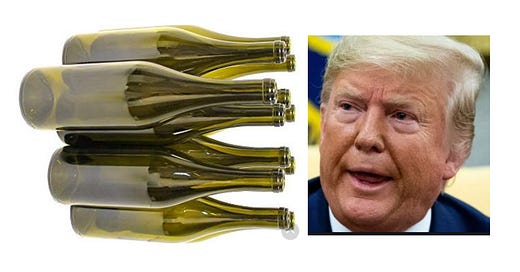Wine in an Age of Populist Outrage
Wine in America is under political threat like it hasn't seen since Prohibition. How did we get here? And could sausage parties save us?
President Donald Trump, having already imposed tariffs of 25% of certain French wines in October, now threatens to impose tariffs of up to 100% on a much wider swathe of EU wines.
Meanwhile, Democratic presidential candidate Elizabeth Warren wants wealthy Americans who own wine cellars - or, as she memorably put it in December's Democratic primary debate, “wine caves” - to play a less outsized role in the US political process.
Trump's threats ostensibly involve EU Airbus subsidies and France's digital tax on internet commerce. Warren is attempting to expose her rival Pete Buttigieg as a corporate shill. But both Trump and Warren are seeking to leverage wine’s symbolic power in the American psyche to paint their adversaries as elitist.
That wine should find itself so prominently weaponized in the US election tells us something about what wine means to Americans. To a majority of Americans, wine is, apparently, an indefensible luxury, like caviar or private jets. Politicians are comfortable throwing the wine industry under the bus.
To US wine professionals, this is at once galling and terrifying. It's terrifying, because it threatens everyone's livelihoods. It's galling because most US wine professionals have some idea of the honest labor that goes into the production - and transport, and warehousing, and sales, and service - of quality European wine. It's also galling because, let's face it, most US wine professionals, myself included, began their careers as waiters and bartenders and sales clerks. These are not silver spoon professions. For many of us, it feels like some kind of cosmic joke to find ourselves implicitly placed alongside investment bankers and real estate tycoons as targets of populist outrage.
Members of the US wine industry have reacted to the tariff threat with a series of heartfelt, literate exhortations to fellow Americans to notify congress of their dissent. I don't know if congresspersons actually react to this sort of outreach. It seems possible that wine in the USA might just be politically indefensible right now. (Warren's uncharacteristically careless deployment of the wine trope would seem to indicate this.) It also seems possible that by visibly protesting Trump's tariff threat, US wine professionals are creating the very spectacle that Trump sought: heartfelt, literate liberals in hysterics over their precious grands crus.1
How to respond appropriately? How do US wine professionals convince not just their congresspersons, but their fellow citizens, that wine is not an intrinsically elitist beverage?
Firstly, it seems important to admit that the wine industry is complicit in creating the present imbroglio. We can’t market wine as a luxury for decades and then cry foul when its luxury status makes it a target of populist politics. It's high time to recognize that the luxury objectification of wine works against the interests of wine. Wine professionals who insist on Zaltos and other expensive glassware; who pose for selfies with bottles of DRC; who organize 'Champagne & caviar' events; who humblebrag about travel schedules; who receive clients in elaborate space-age tasting rooms: this goes out to you. These habits contribute to making the subject of wine a cultural pariah.
European wine as a category doesn't need us to convince fellow Americans of its literal value. Rather, it needs us to convince others of its accessibility. This means doing the opposite of exoticizing it.
For this, concerned members of the US wine industry might gainfully take a cue from France, where wine's role in populist politics is precisely the opposite.
In France and other historically wine-producing nations, wine retains its link to rural peasant culture, long an electoral bastion of the far right. Far from distancing themselves from wine, nativist (which is to say, racist) politicians like Trump in France and Italy tend to embrace wine, using it along with charcuterie as a dogwhistle to rouse supporters against the supposedly nefarious influence of Muslim culture. Far-right politicians in France have a notorious habit of organizing racist gatherings under the guise of "wine and sausage parties," oblivious or indifferent to how hilarious that sounds to American ears.
To American ears, it doesn't sound racist or nativist. Nor would an American neighborhood 'wine and sausage' party necessarily be these things, since cultural fault-lines run along different axes in the USA. Such parties in the USA would probably be kind of fun and informal. Wine in America could probably benefit from less caviar speakeasies, and more taco nights, more backyard concerts, more sausage parties.2
Related Links
Dave McIntyre, in the Washington Post, writes of the October round of wine tariffs: "Inexplicably, this measure did not apply to wines over 14 percent alcohol or to sparkling wines." As far as I understand, this can indeed be explained by the fact that the existing tariffs pertaining to wines over 14° alcohol and sparkling wine were already distinctly higher than those pertaining to wines under 14°. The influence of LVMH chairman Bertrand Arnault probably didn't hurt Champagne's cause.
PUNCH contributing editor Jon Bonné's twitter thread about the looming wine tariffs. Jon also does a good job summarizing some of the potential knock-on effects of wine tariffs in his 2020 forecast for PUNCH.
Wine Searcher's W. Blake Gray is relatively sanguine about the prospect of further wine tariffs.
Natural wine importer Jenny Lefcourt of Jenny & François Selections writes, "I spent twenty years of my life building a successful business, and in one signature the Trump administration could make it all crumble."
Kevin Day, writing for Opening A Bottle, urges readers to "Get involved to protect American jobs and the wines we love."
It seems significant that among the many EU foodstuffs presently under threat of tariffs, wine is the one sparking calls-to-action, not cheese or olive oil or ham.
Non-racist ones. With women invited, obviously.



